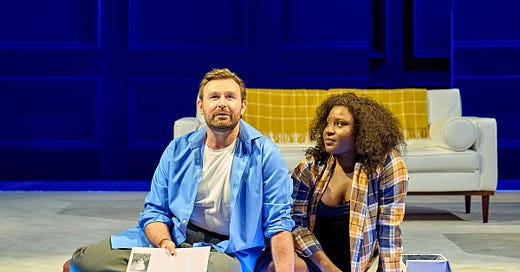Love and marriage
It's in the air this week in London - plus the latest exhibitions, gigs and more
Britain’s Paralympians have been knocking it out of the park in Paris but if writing were an Olympic sport it feels like, at the ripe age of 87, Tom Stoppard might be in with a very good chance of a medal. The Real Thing at the Old Vic, which runs to October 26, is an absolute pleasure, even if it is showing its age a bit.
James McArdle is superb as Henry, a self-important, snobbish, mansplainy playwright with a weakness for deeply uncool pop music, whose erudite wit and knowing pretension somehow make him a delight to watch (I mean, you’d expect that, since he’s clearly based on Stoppard).
He’s in love with Annie (Bel Powley), a younger actress, who is married to another actor, Max (Oliver Johnstone), who is a bit of a dimwit, while Henry’s actress wife Charlotte (Susan Wokoma), is sharp as hell. Everyone exhibits that complex, contradictory, needy, self-conscious carelessness so often found in the artist. But we love these people, these prime, preening examples of the Primrose Hill set, slightly awful though they undoubtedly are, because they’re very funny, very clever, and they feel things so very, very deeply.
We perhaps don’t feel it quite so deeply, on the night, possibly because they’re so very wordy and smug. Though some of Stoppard’s pronouncements about the nature of love and the way that we treat each other under its spell will strike major chords (Henry’s paean to sexual love, the idea of ‘carnal knowledge’ being the ultimate in being seen, is beautifully expressed), this isn’t what you’d call moving. And the one working class character, an imprisoned protester, Brodie (Jack Ambrose, doing his best with very little), whose cause Annie has taken up, is little more than a Macguffin and given no depth at all.
But overall it’s a joy. Max Webster’s playful direction and Peter McKintosh’s striking set bring the 40 year-old piece gently up to date, nodding to Henry’s own (sometimes not very good) plays with the increasing involvement of the stage hands. Layers of truth and deceit, play and performance unfurl. It’s really fun.
The Marriage of Figaro, which has just opened at the Royal Opera House (now rebranded in a font I’m not sure about as the Royal Ballet and Opera) is a hoot. It’s longer than Titanic (by 15 minutes) but doesn’t feel it, because there’s so much business to get through that you never have a chance to get bored. And it’s Mozart, so the music is sublime, and whoever has translated Lorenzo Da Ponte’s libretto has made it very funny. Which isn’t always a given, because it’s unbelievably silly.
In short: the barber Figaro (a role that seems to involve absolutely no grooming) is about to marry the Countess’s maid Susanna, but the Count, who is a bona fide sex pest, wants to bed her before her husband gets the chance (a feudal tradition known as droit de seigneur, or ‘the master’s right’, which the Count has abolished but now is keen to reinstate). Almost everyone gets involved in trying to stop this happening in a variety of extravagantly complicated ways.
Meanwhile a woman called Marcellina is determined to hold Figaro to a contract he very unwisely signed, agreeing to marry her if he were unable to repay a sum of money he borrowed at some earlier point. Oh and there’s a horny young page called Cherubino who would race off any female in a five mile radius if he were given half a chance.
Keep reading with a 7-day free trial
Subscribe to The London Culture Edit to keep reading this post and get 7 days of free access to the full post archives.





